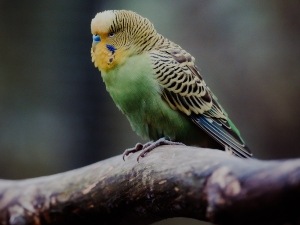
Budgies can live for several years, the average lifespan of a budgie is about 4 to 8 years and some can even live up to 15 years if they are healthy, but illnesses can claim your budgie’s life and shorten their lifespan.
If your budgie’s poop is green and watery then you may think that the bird is sick and you may be worried, this article explores why this may be happening
Table of Contents
Why is my budgie’s poop green and watery:
Maintaining your budgie’s health is an important part of taking care of these birds, and one way to assess the health of your budgies is to keep an eye on their poop.
The bird’s poop is widely determined by what the bird eats, your bird’s feces should be green in color but if the bird eats pellets then your bird’s normal poop color will be brown.
That being said, a sudden change in your bird’s poop color from brown to green will be alarming.
If the bird’s poop is usually brown, and then changes to become green and watery, then this may be why:
Diet change:
A diet change can cause a change in your bird’s poop.
Birds eat dry food and the bird’s body turns this dry food into the brown solid portion of your bird’s poop, this is the feces part.
Your bird also releases a chalky-like and white material called urea and a clear portion which is the bird’s urine.
This solid portion can change color depending on what your bird has eaten before and its consistency can also change depending on what your bird has recently eaten.
If the bird recently ate more dark leafy greens, then its poop will turn a more green color. Lots of fruits and vegetables can cause your bird’s poop to become mushier rather than solid.
If the feces part of your bird’s poop is completely watery the bird is suffering from diarrhea and may also have eaten a lot of green foods.
What to do:
Diarrhea is quite dangerous for your bird, it can quickly cause your bird to become dehydrated because of the rapid loss of fluids in your bird’s body.
Diarrhea can also cause your bird to develop general weakness because of the loss of salts and minerals that are removed from the bird’s body as it passes along with diarrhea.
A budgie that isn’t eating:
A bird that is not eating enough will produce poop that is green, this poop will be dark green and may also tend toward black.
If the bird is still drinking fluids then the bird won’t be producing much poop and the little poop that the bird does produce may be being watered down by the bird’s urine.
Your bird may not be eating enough because it doesn’t like the food that it is being given or because the bird is being bullied away from food sources.
Old age or infection may also be the reason why your bird is producing green poop.
What to do:
You’d need to figure out why your bird isn’t eating enough. If the bird is being bullied then you’d have to remove the bully bird and allow the bullied bird to eat.
If the bird is not eating because it doesn’t enjoy the pellet food that you’re feeding it then you may want to consider giving the birds something else to eat.
If you think that your bird has an infection then take your bird to the vet.
Melena:
If your bird is producing watery diarrhea poop with a greenish tint then the bird may have a disease called melena.
Birds can develop this condition if there is bleeding in the bird’s upper GI tract.
This disease will cause the bird’s droppings to turn liquid and the poop may be black or have a green tint to it once released by the bird.
Other signs that you should look out for if you think that your bird has this ailment are bloody stools, lethargy, ruffled feathers, a lack of appetite, the bird tucking its head under its wing, and vomiting.
What to do:
You should keep an eye on the bird to see how often the bird passes this green diarrhea as a diet change can cause a sudden change in your bird’s poop.
Keep an eye out to see if the poop change is consistent or if it is a one-time thing. If the bird poops green constantly then it may have melena.
If you think that your bird does indeed have melena then you’d need to take your bird to the vet for an examination and treatment.
Also, keep a record of your bird symptoms and share this information with your vet should they ask.
The vet will run tests on your bird, including fecal tests, blood work, and a biochemistry profile to diagnose your bird.
The treatment that your vet recommends for your bird will be determined by the reason why your bird has this ailment in the first place, this may vary as melena is caused by different factors.
If you enjoyed this article then you may also be interested in other bird related articles. Here are some articles that you may be interested in: Why Does My Bird Sleep In His Food Bowl, How To Clean A Parrot Beak, Bird Rubbing Beak On Perch, Pigeon Diarrhea Home Remedy, Cockatiel Beak Fungus, Why Do Birds Rub Their Beaks On Each Other?, Why Is My Cockatiels Beak Peeling

